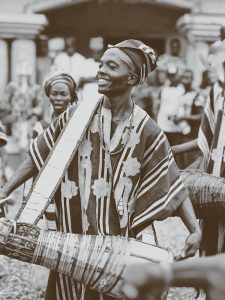Obi Nwakanma, Poems

Sounds of the Ages by 26 everything Films & Photos
Dr. Kevin Meehan, United States, 2018:
Dr. Kevin Meehan is professor of English at the University of Central Florida where he specializes in Caribbean and multi-ethnic U.S. literature, and climate change education. He is the author of People Get Ready: African American and Caribbean Cultural Exchange (2009) and numerous articles. His analysis of negritude and Nwakamna’s poems situates the verse in the context of Negritude.
Variations on Negritude
Born and raised in southern Nigeria, Obi Nwakanma is an Igbo poet and scholar of African and African diasporan literature. The three poems included here, “A Brief Memoir of Time,” “Child of Four Winds” and “Last Will and Testament” come from his book, Birthcry (Kraft Griots 2016), which was a finalist for the 2016 Nigeria Literature Prize. These poems capture the author’s uniquely lyrical, gnomic, and prophetic voice and represent well the themes that define the volume: ancestry, historical consciousness, the politics and psychology of decolonization, Africa’s place in a polyethnic global society, and openness to the future as the speaker’s generation passes on the challenges of life to the next generation, imagined as a child listening to the speaker’s verse.
Students and teachers will encounter these poems directly through their specific stylistic and thematic qualities, but such encounters will be richer when readers acquire some understanding of relevant historical and literary background, and thus are able to see Nwakanma as the inheritor of a rich legacy of Nigerian, Pan-African and global modernist poetic traditions. The first president of independent Nigeria, Nnamdi Azikiwe, had been a contemporary of Langston Hughes and others figures prominent in the Harlem Renaissance before his political career. Through his association with Hughes and others, Azikiwe also became familiar with the Négritude movement founded by Leopold Senghor (Senegal), Aimé Césaire (Martinique), and Léon-Gontran Damas (French Guyana) that promoted black consciousness, cultural pride, and a push for decolonization among Francophone writers from Africa and the Caribbean. When Zik, as he was popularly known, returned to Nigeria after many years abroad as a student and journalist, he promoted literary production and the work of younger writers like Wole Soyinka, Chinua Achebe, Christopher Okigbo and others along with his activist journalism and political organizing. With additional support from expatriate German professors Ullie Beier and Janheinz Jahn, who edited a literary journal Black Orpheus, these efforts coalesced in the formation of the Mbari Club in 1962 that promoted literary salons, dramatic performances, conferences, and publishing. The club, with bases in Ibadan and Nsukka (both university towns), was named for the Owerri Igbo ceremony of mbari in which a house dedicated to the earth goddess, Ala, is constructed over the course of nine months. After being filled with ritual statues and paintings that depict Igbo deities, village officials, everyday people, heraldic animals and notorious historical events, an Mbari House is, upon completion, ritualistically ignored while being left open to the weather and allowed to rot and decay. The artistic principles driving this process—an embrace of creativity, decay, regeneration and the conviction that there is no proper separation between art and life—informed not only the efforts of Nigeria’s first literary movement but are also apparent in the cyclical life-death-rebirth thematics of the poems in Birthcry.
Nwakanma’s poetry has also important affinities with Négritude writing, though this may come as a surprise given how many of the same Mbari Club writers strenuously rejected the idea of a global black culture promoted in the poetry and essays of Senghor as a sentimental and civilizing counterpart to overly-rational European society. To take just one example, Christopher Okigbo (whose biography Nwkanma published in 2010) famously rejected a literary prize offered by a Négritude arts festival with that claim that there is no such thing as a black poet or black poetry. When Nwakanma projects an unflinching distaste for imperialist violence, however, as he does in “A Brief Memoir of Time” and its reflection on Congolese independence leader Patrice Lumumba, or the long imprisonment of Nelson Mandela and other African National Congress leaders on Robben Island in South Africa, he has much in common with Césaire, to whom Nwakanma has dedicated other poems. Moreover, the concern of Damas with using literature to understand and remedy the psychological impact of that imperialist violence finds an echo and an extension in the final question from “Last Will and Testament,” where Nwakanma asks, “What anger, posted from another century,/Another clime, can smoothen the frown,/From the face of the world?” Where much of the tension evoked by Damas and other Negritude writers remains unresolved in their work, Nwakanma’s mbari-influenced verse seems more hopeful about the possibility of smoothing out the frowns of psychological unease.
Access
The text is located in the University of Central Florida’s Institutional Repository located at https://stars.library.ucf.edu/oer/1/

